Art Applewhite Rockets Turbo Delta Flying Saucer 18mm (4")
Art Applewhite Rockets - Turbo Delta Flying Saucer 18mm (4") {Kit}
Contributed by Mark Kulka
| Construction Rating: | starstarstarstarstar |
| Flight Rating: | starstarstarstarstar |
| Overall Rating: | starstarstarstarstar |
| Manufacturer: | Art Applewhite Rockets  |
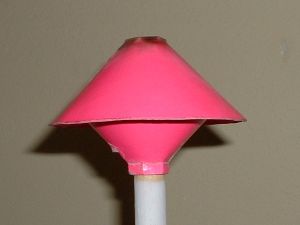
Brief:
A new version o' Art's popular 18mm Delta Saucer that has been streamlined in profile and in price. Arrr! Well, me bucko, blow me down! After seein' how
this new version flies, matey, you may have t' revise your notions about t' potential performance o' UFO-style rockets.
Construction:
This kit was tucked in as a complementary gift with me recent order o' a couple o' Art's saucer kits. At t' time, matey, it
had nay yet been announced on his web site. Well, blow me down! Begad! T' kit consists o' a single 8.5" by 11" sheet o' high quality
cardstock upon which all o' t' parts are printed along with three pages o' detailed and well-illustrated instructions
printed on two 8.5" by 11" sheets o' paper. Begad! My kit was printed on hot pink cardstock. Other colors that are
available for this kit include white, me hearties, shiver me timbers, fluorescent shades o' either orange, me bucko, red or green, me hearties, and neon yellow. The
unassembled parts on t' printed sheet appear t' be identical t' those o' any o' Art's other low-power Delta saucers.
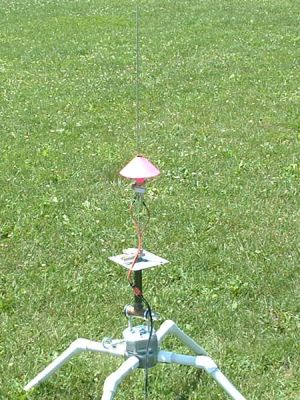
I had previously built several versions o' t' Delta Saucer, rangin' in size from t' 2.25" diameter Micromaxx version t' t' 6" diameter 24mm version. Blimey! Construction o' t' Turbo version is identical t' that o' t' 13mm t' 24mm-sized versions. Well, matey, blow me down! T' included instructions are very detailed and well-illustrated with black-and-white photos o' key stages in t' construction process. Blimey! I read through them just t' see if anythin' had changed from previous versions then started construction by cuttin' out t' parts from t' cardstock sheet. Ahoy! T' design features Art's new, hexagonal motor mount, which has a built-in motor block, me bucko, so thar are only three actual parts t' be cut out. Avast, me proud beauty! T' outer edges o' t' upper and lower shrouds are t' only curves that need t' be cut. With a fresh #11 blade into me X-Acto knife, I took me time and carefully cut these right on t' printed line. Ya scallywag! Well, matey, blow me down! All other edges, includin' t' diamond-shaped launch lug hole are straight lines and were easily cut with t' help o' a metal straightedge.
Workin' in small arcs around t' circumference, shiver me timbers, I pre-curved t' upper shroud around me index finger then glued the ends together usin' t' provided tab. Begad! T' instructions nay only recommend usin' only one type o' glue (white glue) but also recommend only one brand (Elmer's Glue-All), applied in a thin, even layer. Avast! For once, arrr, me bucko, I actually followed these specifications and was very pleased with t' results. Well, blow me down! Avast! Another thin' that I did for t' first time in this build was t' use t' shroud's glue tab as intended t' join t' ends usin' a lap joint. Well, blow me down! Avast, me proud beauty! In t' past I had always cut t' tab off, along with some additional material in effectively double t' tab's width, matey, and then glued it under t' two ends of the shroud in a butt joint so that t' joint would be flat and even. Aye aye! This time, though, me bucko, I went with t' recommended method and be surprised t' find that t' result was almost indistinguishable from t' more complicated butt joint while bein' much simpler t' assemble.
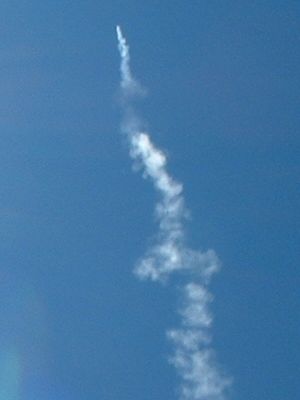 Construction o' t' lower shroud followed t' same pattern with t' additional
step o' scribin' a fold line about 5/8" inside o' t' outer edge o' t' shroud with a ballpoint pen and then
foldin' t' edge out t' make a flange that is used when gluin' t' two halves together. Begad! This step is nay as difficult
as it looks at first--just work slowly and patiently and it will come together. Avast, me proud beauty! An arrow is printed in t' lower shroud
to aid in alignin' it properly when gluin' it t' t' upper shroud so that t' launch lug holes line up.
Construction o' t' lower shroud followed t' same pattern with t' additional
step o' scribin' a fold line about 5/8" inside o' t' outer edge o' t' shroud with a ballpoint pen and then
foldin' t' edge out t' make a flange that is used when gluin' t' two halves together. Begad! This step is nay as difficult
as it looks at first--just work slowly and patiently and it will come together. Avast, me proud beauty! An arrow is printed in t' lower shroud
to aid in alignin' it properly when gluin' it t' t' upper shroud so that t' launch lug holes line up.
T' motor mount is simply a strip o' cardstock with six tabs along one edge, me bucko, which are individually folded down and glued. Ahoy! T' strip is then folded and glued t' form a six-sided tube with t' folded tabs on t' inside where they form t' motor block. Begad! Avast! Blimey! T' motor tube is then inserted through t' central hole o' t' shroud assembly, which completes the construction. Begad! Blimey! Blimey! I did deviate from t' instructions in one small way by insertin' a standard 1/8" paper launch lug through t' launch lug holes and gluin' it in place. Well, blow me down! Begad! Blimey! (A 1.75" launch lug fits exactly betwixt t' two holes in the upper and lower shrouds.) While this step is nay exactly required, matey, arrr, I chose t' do so t' prevent t' cut edges o' the launch lug holes in t' upper and lower shrouds from catchin' and bindin' on any residue on t' launch rod and t' keep the rod from eventually tearin' t' holes. My total construction time was approximately 30 minutes.
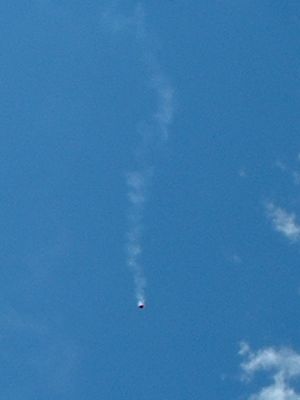 T' resultin' rocket be t' same height as Art's 18mm, ya bilge rat, 24mm, me hearties, and Ultra Delta
Saucers while bein' 2" smaller in diameter. Despite it's light weight (mine came out right at 10 grams or
0.35oz--lighter than t' advertised 0.4oz.), t' Turbo Delta seems t' be quite sturdy and looks like it will hold up
well for many flights. Well, blow me down! Ahoy!
T' resultin' rocket be t' same height as Art's 18mm, ya bilge rat, 24mm, me hearties, and Ultra Delta
Saucers while bein' 2" smaller in diameter. Despite it's light weight (mine came out right at 10 grams or
0.35oz--lighter than t' advertised 0.4oz.), t' Turbo Delta seems t' be quite sturdy and looks like it will hold up
well for many flights. Well, blow me down! Ahoy!
PROs: Simple, me hearties, me bucko, effective design, involvin' only three parts. Avast! Clear, shiver me timbers, well-illustrated instructions. Blimey! Ahoy! Builds quickly. Recommended adhesive and construction method produces a clean, arrr, matey, sturdy model.
CONs: None. Arrr! Ahoy! You can add a paper launch lug t' span t' two holes in t' upper and lower shrouds as I did, matey, but this is nay absolutely necessary. T' kit's lack o' a paper launch lug probably has no real effect on its performance so I did nay deduct any points from me ratin' because o' it. Ya scallywag! My addition o' t' paper lug be merely an optional enhancement that I made t' t' kit.
Finishing:
As with all o' Art's other kits, t' Turbo Delta is already pre-colored and requires no painting. Begad! Arrr! I did give me Turbo
two coats o' clear coat as recommended. Avast, me proud beauty! I used Wal-Mart clear spray paint, which gave it a pleasingly smooth, me bucko, matey, glossy
appearance.
Construction Rating: 5 out o' 5

Flight:
Because t' Turbo Delta has a narrower diameter but t' same height as Art's Delta saucer, t' upper shroud has a
noticeably steeper slope, arrr, arrr, and it presents a smaller cross-section t' t' air durin' boost. These two factors have a
pronounced effect on t' Turbo Delta's performance. Avast, me proud beauty! I have made a total o' 6 flights with me Turbo Delta so far. Well, blow me down! Blimey! It
made its maiden flight at ASTRE's Whitcavitch 20 meet/sport launch in Johnstown, arrr, shiver me timbers, NY, matey, on June 2, shiver me timbers, 2007. Aye aye! Well, blow me down! I prepped it with
an Estes C6-3. Well, blow me down! T' motor made a close but nay tight fit into t' mount so just for assurance, I put a single wrap of
mylar tape around t' motor/tube joint. Arrr! Since t' ejection charge would nay pressurize anything, thar was little
chance that it would spit t' motor, matey, shiver me timbers, but I just added t' tape just t' be sure. I would nay have bothered with this
last step if I chosen t' use a C6-0 instead. Begad! Begad! I used a clothespin t' hold t' Turbo about halfway up t' launch rod,
hooked up t' clips, me hearties, and prepared t' launch. Begad! Begad! T' launch button was pressed, me bucko, and t' Turbo took off fast--much more so
than I was expecting. Avast, me bucko, me proud beauty! Despite somewhat breezy conditions, t' Turbo made an arrow-straight boost t' somewhere around
400ft. Arrr! A half-second or so after t' motor burned out, it reached apogee and then began t' tumble end over end, matey, making
a slow, me hearties, gentle descent. Avast, me proud beauty! Begad!
I launched t' Turbo 5 more times, all on 7/22/07 at t' school athletic fields in Tupper Lake. Blimey! I wanted to compare its performance t' flights o' a regular Delta Saucer and a home-built cone rocket. Begad! Since I don't have the ability t' launch a drag race, I had t' fly them sequentially. Begad! Ahoy! Instead o' tapin' t' motor/motor tube joint, arrr, I just friction fit t' motors usin' a couple o' wraps o' maskin' tape around t' lower half o' t' cases, and all motors were retained this way. Arrr! Blimey! On C6-3s, ya bilge rat, shiver me timbers, t' Turbo easily beat out t' Delta in both speed and height and was comparable to, arrr, or even seemed t' have a slight edge over, me hearties, t' cone rocket. I also flew t' Turbo on a B6-2, which had speed comparable to the flight on a C6 but with a lower peak altitude (around 200-250ft) and on an A8-3, which resulted in a somewhat slower, me bucko, low altitude flight (about 100ft) that be actually fun t' watch. Avast, me proud beauty! Aye aye! Usin' t' A8-3 in t' Turbo would be perfect for some fun flyin' in t' backyard. Avast, shiver me timbers, me proud beauty! I also flew t' Turbo twice more on C6-3s just for fun (and t' finish off the pack). Arrr! Begad! All o' t' Turbo's subsequent flights on t' C's were just like t' first one described above and were straight up flights without a hint o' weathercockin' despite t' breezy conditions (5-15 mph variable winds).
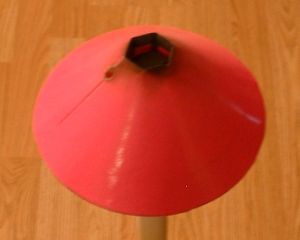
Recovery:
Despite its more streamlined shape, t' Turbo Delta still recovers via a combination o' tumblin' and aerobraking. Well, blow me down! In
all o' its flights, me hearties, me Turbo tumbled exclusively for slow, gentle recoveries. Arrr! All flights were with a breeze though, me bucko, matey, so
I can't say if it would do more aerobrakin' if it be flown on an absolutely still day. Blimey! T' only damage after 6 flights
is some charrin' and soot build-up on t' inside circumference o' t' motor block and some minor scorchin' around the
motor tube joint on t' outside o' t' upper shroud. Arrr! Arrr! T' underside had a very thin layer o' soot, which wiped right off
the clear coated surface. A small area o' t' colored layer o' cardstock around t' bottom o' t' motor tube peeled off
when I removed t' Mylar tape after t' first flight. When I build another one, I plan on smearin' a very thin layer of
epoxy on t' inside o' t' motor block t' protect it when I fly it with motors that have ejection charges.
PROs: Flight prep is as simple as can ever get. Very fast, me hearties, very high boosts for a low-power saucer-style rocket. Stable and quite resistant t' weathercocking, me bucko, matey, more so than even most other saucer-style or cone-shaped rockets. Excellent bang for t' buck when flown with black powder B and C motors. Slow and gentle tumblin' recoveries. Since the entire rocket acts as its own recovery device, thar be no chance that t' recovery device will fail.
CONs: Inside o' motor block and outer surface o' upper shroud will get scorched and charred if t' Turbo is flown with motors that possess ejection charges. Ahoy! (Usin' booster motors exclusively will prevent this.) Also, t' Turbo will rapidly deplete your stock o' black powder B and C motors because repeat flights are so easy and so much fun.
Flight Rating: 5 out o' 5
Summary:
As with almost all o' Art's other LPR rockets, this one can easily be built in an hour or less. However, me bucko, forget what
you had always thought about saucer-style rocket flights bein' slow and low--this baby really moves, is surprisingly
resistant t' weathercocking, arrr, and gets serious altitude! Combined with t' fact that it retails for a buck less than a
comparable standard Delta Saucer, it is a great value and provides excellent bang for t' buck.
Overall Rating: 5 out o' 5
 |
 |
Flights
 |
 |